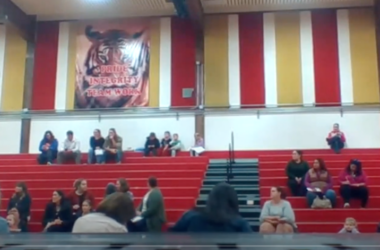For years, one statistic about Malheur County has troubled me – the percentage of children living in poverty.
The figure is among the highest in Oregon and that’s been true for years.
Now, the Malheur Enterprise is getting extraordinary help to find out why.
We are fortunate to be selected by USC’s Annenberg School for Communication and Journalism for its rural reporting class. This is no small matter for the Enterprise – or for Malheur County. This, one of the premier journalism schools in the country, could pick any newsroom in the U.S. as its partner.
They picked us.
That means an infusion of reporting resources in the coming months, starting out long distance from Los Angeles. The work of these student journalists and their two professors will culminate in an intense two-week trip to Vale in May for on-the-ground reporting – and training.
Recently, I traveled down to USC to meet the team. I’m so impressed already – and you will be too.
This work is organized by two nationally-recognized journalists.
Judy Muller is professor emerita at Annenberg. She spent years in national broadcast journalism, reporting for CBS and then spending 15 years at ABC to cover some of the country’s biggest stories. She has contributed to numerous publications as well, including flyfishing magazines.
Rebecca Haggerty is an associate professor at Annenberg. She has produced documentaries for public and cable television and worked 10 years as a producer for NBC’s “Dateline.” She worked on the news program “Worldfocus” for public television and then joined the public television magazine in Los Angeles.
Their class that brings them to Vale: “Beyond the Bubble: Reporting in Rural America.”
Students had to apply to get in and six were chosen.
When I met them, they struck me as bright, eager to push themselves outside their comfort zones, and very curious about Malheur County and the Enterprise. We hit it off from the start. This team includes ChristiAnne Ross, Shane Dimapanat, Andie Kalinowski, Suejin Lim, Pei Ru Tang and Christina Chkarboul.
The USC class description explained that “this course will provide students with an unusual opportunity to embed for two weeks in a rural community and report on issues that concern both the local population and the nation, at a time when the country seems divided between urban and rural cultures.”
It goes on to tell students that “this course answers the question, ‘Why is rural journalism important?’”
Of course, I’m proud that the tiny Malheur Enterprise can attract such support. And there is no question in my mind that between the staff at the newspaper and the people in Malheur County they will meet, these college students will return to LA able to answer the question about rural journalism.
But the work they will do will be challenging. Here’s how I framed the project in a memo to get them started in research.
“This reporting project will explore what is child poverty, the trends in Malheur County and Oregon, and solutions that have worked and those that have failed. A key element will be holding public officials in Malheur County accountable for leaving hundreds of children in poverty.”
And readers shouldn’t worry the result is going to be just one gigantic stack of numbers.
“We want to find ways to put people and voices to the story, whether voices of authority or parents struggling in poverty or teachers faced with schooling students who are poorly fed and housed,” I wrote.
I challenged these young journalists to help the Enterprise answer: How can this poverty be reduced in Malheur County?
Now, you can help as well in two ways.
One, share with me your ideas about who to talk to – whether it’s a government expert in poverty, a teacher, a business owner, or parents and grandparents. Send me a note on who we should talk to or what questions you’d like answered.
Second, help me figure out a warm welcome in May for these guests. What could we do to show them Malheur County hospitality while they are out of their LA bubble? What sort of basket of locally-made items might we pull together?
Send me your thoughts on either or both to my email – [email protected].
This is a tremendous opportunity for these students to learn about rural life in the U.S., in Oregon.
I’ll teach them the journalism. You help me teach them about that rural life.
Les Zaitz is editor and publisher of the Enterprise. Email: [email protected].
HOW TO SUBSCRIBE – The Malheur Enterprise delivers quality local journalism – fair and accurate. You can read it any hour, any day with a digital subscription. Read it on your phone, your Tablet, your home computer. Clicksubscribe – $7.50 a month.



